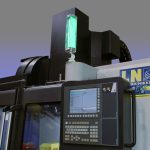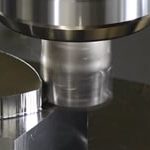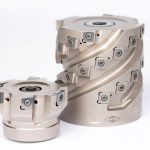Taiwan Touts AI, Custom Solutions at IMTS 2024
Taiwan Touts AI, Custom Solutions at IMTS 2024
At IMTS 2024, Taiwan manufacturing leaders heralded their smart manufacturing progress at the "Integrate to Innovate: Smart Machine Application Forum."
At IMTS 2024, Taiwan heralded its leadership in smart manufacturing with a prominent showing at the Taiwan PMC Press Conference & Product Launch and the "Integrate to Innovate: Smart Machine Application Forum." These events demonstrated Taiwan's latest developments in AI-driven manufacturing and customized solutions, showcasing the country's commitment to advancing global manufacturing through technology.
The Precision Machinery Research & Development Center (PMC) played a key role, introducing products that focused on green transformation, digital innovation and Taiwan's manufacturing ecosystem. Taiwan's machinery sector has firmly established itself as a player in Industry 4.0, with AI taking center stage. From predictive maintenance and automation to real-time monitoring, AI integration is optimizing machine tool capabilities and positioning Taiwan at the forefront of manufacturing's ongoing evolution.
Taiwan's Leading Machinery Companies
At the Integrate to Innovate forum, Dr. Jay Lee, director of the Industrial AI Center at the University of Maryland, provided key insights into AI's potential in manufacturing. "Traditionally, we work hard to solve problems, but with AI, we can predict them and avoid them altogether," Lee explained, highlighting AI's ability to forecast machine degradation, minimize downtime, and enhance efficiency.
Several of Taiwan's top machinery companies, including CHMER, COSEN, and Tongtai, shared how AI is transforming their operations. Ron Vogel, President of EDM Network, discussed how the integration of robotic arms with AI-driven systems is reducing manual labor in EDM operations. "Robotic arms, combined with AI-driven predictive maintenance, streamline EDM processes, freeing up labor for more strategic tasks," Vogel stated.
On the cutting side, Hayden Peterson, Marketing Manager at COSEN, focused on AI's ability to automate cutting operations by identifying wear in cutting tools and triggering automated replacements. "AI reduces delays caused by tool wear and eliminates much of the manual oversight, improving both precision and efficiency," Peterson noted.

PMC Role in Driving Innovation
At the Taiwan PMC Press Conference & Product Launch, major Taiwanese manufacturers such as Kao Ming, Tongtai, Quaser, and Sunfirm introduced AI-integrated products designed to streamline production and enhance green transformation efforts.
Arthur Deng, overseas sales manager at Tongtai, emphasized Taiwan's capacity to deliver customized machinery for industries like automotive and aerospace.
Lily Chan from Kao Ming presented the company's thermal displacement compensation system, which reduces machining errors by 67% through real-time temperature monitoring, to help demonstrate Taiwan's leadership in smart manufacturing.
Meet Mr. Q
One of the standout innovations was Mr. Q, an AI system integrated into Quaser's machines. Demonstrations showed how Mr. Q uses real-time data analysis to allow operators to manage machine operations through voice commands and receive instant feedback. With features such as spindle warm-up checks, tool condition monitoring and carbon emission tracking, Mr. Q simplifies complex tasks while enhancing operational efficiency.
"Mr. Q isn't just reactive — it anticipates issues before they happen, reducing downtime and operational costs," a spokesperson from Quaser explained.
AI-Driven Innovation
Taiwan's adoption of AI in manufacturing is not only about improving efficiency but also about transforming the production process itself. Jerry Chen, product manager at Maindrive Corp., explained how AI management systems automate tasks like spindle warm-ups and carbon emissions tracking, contributing to more responsive and streamlined workflows.
In an interview, the Taiwan Smart Manufacturing team provided additional perspective on how Taiwanese manufacturers are assisting U.S. companies in staying agile in a dynamic market.
"Mass production is no longer the norm," said a team spokesperson. "Now, it's about tailored solutions, delivering what the customer needs, exactly when they need it."
The team pointed to Quaser's AI-integrated machines as an example of Taiwan's forward-thinking approach. "With simple voice commands, operators can manage complex tasks, and the machine responds seamlessly. That's Taiwan's strength — simplifying complexity to boost productivity."
By embedding AI across the production line, Taiwan is addressing global challenges such as labor shortages and the increasing demand for customized production. With support from PMC, Taiwan's smart manufacturing ecosystem offers adaptive solutions tailored to industries such as automotive, aerospace and precision machining.
The Future of U.S.-Taiwan Cooperation
As Taiwan's machinery companies continue to push the boundaries of AI integration and customization, they are well-positioned to grow their presence in the U.S. market. Offering cost-effective AI-driven solutions that rival European and U.S. counterparts, Taiwan is becoming an increasingly appealing partner for American manufacturers looking to optimize operations and reduce costs.
The message at both the Taiwan PMC Press Conference & Product Launch and the Integrate to Innovate forum was clear: AI and customization are not just current trends but represent the future of manufacturing. Taiwan is paving the way for the next era of industrial innovation.
—Tim Spaeth





